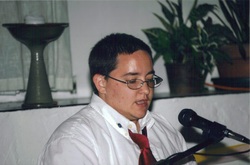Religious Education

A religious leader needs to create age-appropriate opportunities for participation and leadership to help foster ownership and connection in spiritual growth. In Kindergarten, participation means holding the book while the story is being read or having the opportunity to share what the child thinks about the big questions in life. In high school, it is creating the container for spiritual development by encouraging the sharing of the spiritual knowledge in the group, asking complex ethical questions, and challenging youth to engage with the spiritual lives of others through social action and worship. For adults, it means giving plenty of space for people to discuss ideas and inviting leaders with unique knowledge into teaching roles.
A religious leader cultivates Intergenerational relationships in religious education to maintain the overall health of the congregation. Good religious education pays attention to the developmental importance of family and intergenerational relationships. During my time at the Unitarian Universalist Church of Tucson, we offered educational opportunities for families. We offered numerous social justice and ethics workshops with youth and adults together. Also, for those teens who signed the book after Coming of Age, some of our adult programs (though not all) were open to them. Adults were frequently impressed by participation of youth in these classes.
Religious education is not just the job of a Director of Religious Education, but of the entire congregation including the minister. It is something that we do together. The minister’s job is to participate in the spiritual development of all members of the congregation through supporting staff, offering learning opportunities, and engaging with all members of the congregation regardless of age or stage.
A religious leader cultivates Intergenerational relationships in religious education to maintain the overall health of the congregation. Good religious education pays attention to the developmental importance of family and intergenerational relationships. During my time at the Unitarian Universalist Church of Tucson, we offered educational opportunities for families. We offered numerous social justice and ethics workshops with youth and adults together. Also, for those teens who signed the book after Coming of Age, some of our adult programs (though not all) were open to them. Adults were frequently impressed by participation of youth in these classes.
Religious education is not just the job of a Director of Religious Education, but of the entire congregation including the minister. It is something that we do together. The minister’s job is to participate in the spiritual development of all members of the congregation through supporting staff, offering learning opportunities, and engaging with all members of the congregation regardless of age or stage.